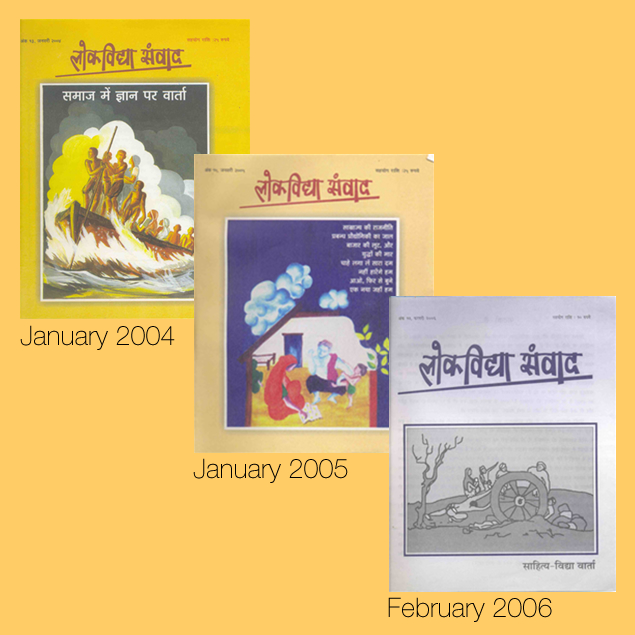Lokavidya Samvad
Lokavidya Samvad was an investigation of the sources of strength in society. Translated into English it reads something like Dialogues on Peoples Knowledge or Dialogue on Knowledge in Society. The publication was started in 1998 during the preparation for Lokavidya Mahadhiveshan, the Third Congress on Traditional Sciences and Technologies of India, at Varanasi. For the required clarity it must be mentioned that lokavidya does not refer merely to the store of information with, and practices of, the people. It refers to their knowledge systems which include logic, values, thinking on organization, methods of organization and communication of knowledge and, of course, the knowledge-store too. It is something that peasants and workers, artisans and women, recreate daily and develop according to their genius, needs and experiences. Lokavidya has served the people in their survival strategies through colonialism and imperialism. Now the Information Age is steadily pushing the knowledge issue to the centre stage. Now is the time for lokavidya to assume the role of contention and challenge. Lokavidya Samvad wishes to serve lokavidya in this transformation from ‘helping to survive’ to ‘strengthening to challenge’. The concept of lokavidya as a central concept around which emancipatory thinking and programs of social transformation need to be organized took shape in 1995. It was as if the decisive link in a stream of developing political thought centered on the concept of knowledge starting some time in early 1980s. The sequence kisan vigyan, nari vidya, swadeshi vigyan, local market, lokavidya, bhaichara vidyalaya, knowledge in society and emancipation of knowledge denotes the development of this stream of thinking to this day. Lokavidya Samvad has given voice to this stream of thinking.
The concept of lokavidya as a central concept around which emancipatory thinking and programs of social transformation need to be organized took shape in 1995. It was as if the decisive link in a stream of developing political thought centered on the concept of knowledge starting some time in early 1980s. The sequence kisan vigyan, nari vidya, swadeshi vigyan, local market, lokavidya, bhaichara vidyalaya, knowledge in society and emancipation of knowledge denotes the development of this stream of thinking to this day. Lokavidya Samvad has given voice to this stream of thinking.
Initially it was published from the Gandhian Institute of Studies at Varanasi, then for a while it had its own independent office and finally it was located at Vidya Ashram Sarnath. Dr. Chitra Sahasrabudhey was the editor.
Seventeen issues were published in all. Unfortunately, we do not have digitized versions as yet. Some special issues are on the following:
- Women’s Knowledge
- Artisan’s Knowledge
- Peasant’s Knowledge
- Local Market
- Healthcare
- Magadh
- Peasant Struggle today
- War on Iraq
- Coca-cola and the struggle against it
- Dialogue on Knowledge in Society
- Dialogue on Literary Knowledge
- Knowledge Satyagraha

